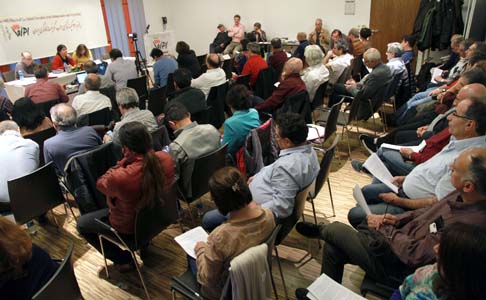
The Worker-communist Party of Iran has held its 44th biannual central committee plenum (the plenary meeting of the central committee) from14th to 15th November 2015. The plenum was attended by a majority of the central committee members, as well as a number of CC advisers and party cadres.
The opening session began with the playing of the Internationale anthem and by the observance of a minute’s silence in memory of all those who have lost their lives fighting for freedom and socialism, as well as in memory of the victims of the Paris attacks by Islamists, which took place just on the eve of the start of the plenum.
The plenum passed three major resolutions: on the political situation in Iran following the nuclear deal; on the global political turn to the left and the crucial role of communists; and on the workers’ movement. Seven minor resolutions were also passed, namely, updating/modernising the party organisation, annual conferences, training and education, seminars, translation of party literature, reporting and fundraising.
In his opening address, Hamid Taqvaee, Leader of the Party, gave an account of the conditions of the class struggle around three areas: Iran, the Middle East and the West. He said in Europe and North America we are witnessing the development of an anti-capitalist movement and discourse, which has influenced even the issues being debated by bourgeoisie’s think tanks and the elections in these countries. In the Middle East, in such places as Iraq, Turkey, Afghanistan, Lebanon and Syrian Kurdistan, the rise of a secularist movement, defending secularism and a civil state in opposition to the ethno-religious states and forces and the ‘mosaic society’ model of governance foisted on these countries, has been a major recent political development in the political setting of the Middle East. In Iran, the nuclear deal and its consequences have led to a greater fragmentation within the Islamic regime and to a more favourable political situation for the advance of the workers’ and other social movements. These conditions place specific practical policies and measures on the agenda of the party, said Taqvaee. A precondition for the application of these policies is for the party structure and procedures to be modernised, updated and made efficient.
In the reports session of the plenum, submitted by Asqar Karimi, the head of the party’s Executive Committee, and by the heads of the other organisations, sections and campaigns of the party, various activities of the party in both Iran and abroad were debated; areas such as the workers’ movement, the teachers’ struggles, the fight against political Islam, the party’s presence on the social media, the status of the party organisation abroad, the financial position of the party and the need for a special focus on the party organisation. One of the issues highlighted in these discussions was the need for the party to more actively and persistently stand up to reactionary nationalist-ethnic movements as well as the repressive policies of the Islamic Republic against people with particular national designations. Another issue that was stressed was the need for a greater focus on the workers’ movement, given the latter’s current growth and increasing political and social weight, with the aim of further strengthening the party’s position amongst labour activists. On the issue of communications and publicity, it was noted that the party should adopt more engaging and vivid forms, moving further away from the forms of publicity used by traditional political tendencies.
Mohsen Ebrahimi, the head of the political bureau, submitted a short report on the work of the politburo. He outlined the main political issues in Iran and globally that were debated in the politburo, stressing the point that the politburo should play a more active role in the two key areas of its responsibilities, namely, monitoring the implementation of the party leadership’s platform, as well as policy development through clearly-defined procedures.
The cadre members of the party actively contributed to the sessions through debates and proposals, which directly added to and helped improve the plenum’s decisions.
On the fringe of the plenum, two seminars were run, namely, on ‘party and class struggle’, by Behrooz Bahari, and on ‘the party’s strategy’, by Mohammad Asangaran. Hamid Taqvaee also presented a discussion on the priorities of the leadership in the next period.
In the elections session of the plenum, Hamid Taqvaee was unanimously elected as the Secretary of the Central Committee (party leader). Also, a political bureau was elected consisting of 23 members, namely, Kian Azar, Mohammad Asangaran, Mohsen Ebrahimi, Mina Ahadi, Abe Asadi, Behrooz Bahari, Siamak Bahari, Sima Bahari, Feteh Bahrami, Keyvan Javid, Ali Javadi, Shahla Daneshfar, Nasrin Ramazanali, Bahram Soroush, Mostafa Saber, Hasan Salehi, Jamil Farzan, Asqar Karimi, Abdol Golparian, Shiva Mahbobi, Navid Minayee, Nasan Nodinian and Kazem Nik-khah.
The plenum closed with the concluding speech by Hamid Taqvaee and in a spirit of solidarity and optimism about the role of the party and the crucial developments under way in the protest movements in Iran.
In a short meeting of the politburo following the plenum, Bahram Soroush was unanimously elected as the head of the political bureau.
Worker-communist Party of Iran
18 November 2015

Be the first to comment